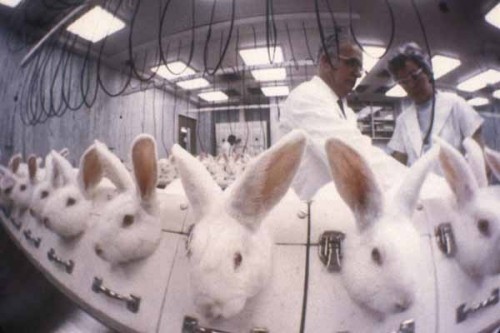 Before anything else written, I would like to discuss the definition of animal testing. What is it? What are animal experiments? An animal test is any scientific experiment or test in which a living creature is forced to undergo something that is likely to cause them pain, suffering, distress or lasting harm. Animal testing include injecting or force feeding animals with potentially harmful substances; surgically removing animals’ organs or tissues to deliberately cause damage; forcing animals to inhale toxic gases and subjecting animals to frightening situations to create anxiety and depression. Animal testing is mainly done to understand phycology or to prevent a human from the harms of a substance. From what we are mostly familiar with, makeup brands usually experiment their products on animals such as rabbits the most cruel and hurting way, in order to avoid any possible complications it may have on a customer.
Before anything else written, I would like to discuss the definition of animal testing. What is it? What are animal experiments? An animal test is any scientific experiment or test in which a living creature is forced to undergo something that is likely to cause them pain, suffering, distress or lasting harm. Animal testing include injecting or force feeding animals with potentially harmful substances; surgically removing animals’ organs or tissues to deliberately cause damage; forcing animals to inhale toxic gases and subjecting animals to frightening situations to create anxiety and depression. Animal testing is mainly done to understand phycology or to prevent a human from the harms of a substance. From what we are mostly familiar with, makeup brands usually experiment their products on animals such as rabbits the most cruel and hurting way, in order to avoid any possible complications it may have on a customer.
Animal testing is a very controversial argument because it has serious ways in which it is reasonable, and many aspects where it is the worst idea to exist. When we disregard the effect it has on the victim animals, it seems very logical to test on anything other than human. First of all, animal testing ensures that the vaccines built are safe. It seems oddly logical because think about how vaccines could be possible if animals weren’t tested, or we would just be inserted a liquid which may have affected most of the people with allergies. Testing for vaccines may be considered in very vital cases since It is a life-saver. “Not having vaccines because animals suffer” will lead to humans dying, which in both cases, we can observe pain, suffer or death. In the other case, if vaccines are banned because they are dependent on animals, a highly contagious virus may kill an innumerable amount of the human population, because there is no cure in the absence of a medical vaccine. This would be the only reasonable intention of testing drugs on animals. So the next time you’re getting vaccinated, consider about how many lives it may have killed. Therefore, the most basic inference that could be made is that its main purpose is to serve human health. In addition, a high portion of tests are done on animals because their DNA and biological systems are mostly identical to us humans, and 94% of those tests fail. What if a human had been vaccinated with those drugs? An immerse amount of people vaccinated would most likely be found dead at the end of the day, which as mentioned, should be the only reason to take advantage of animals at this point.
Another purpose for experimentation on animals is makeup and skincare. If animals are obliged to be tested for something necessary like vaccination, there is almost no reason for them to be tested on that isn’t vital for human health. They are frequently used in the cosmetics industry to be conscious of the effect of different preparations (creams, gels, perfumes, soaps, shampoos etc.) on the skin; and the probability of allergic reactions, diseases and other conditions following the contact with a cosmetic. On personal matters, this reason for usage of animals should be banned because it is not something as concerning as vaccination and the absence of the “perfect lipstick” would in most cases, won’t kill you. The EU has actually banned testing however it doesn’t seem to have affected much of a portion of the industries. Despite the ban on cosmetic animal testing applicable in the European Union, medical and pharmaceutical companies use experiments on a great scale. Many scientists believe that animal testing is the only effective method to evaluate the quality and safety of different products and their ingredients. This position is mostly due to the fact that we, the humankind, have not yet developed any alternative tests for cosmetics, drugs etc. that would be equally effective. In contrast to the idea that It may not be equally effective as testing, many alternative testing techniques have been discovered and are being used by many cosmetics industries. According to Cruelty Free International, alternative methods to animal testing include cell cultures, human tissue, computer models, and of course, even human volunteers. Both cruelty-free products and lab-tested seem to have similar quality and endangering the life of a living creature is completely senseless for something that is not vital for human health.

